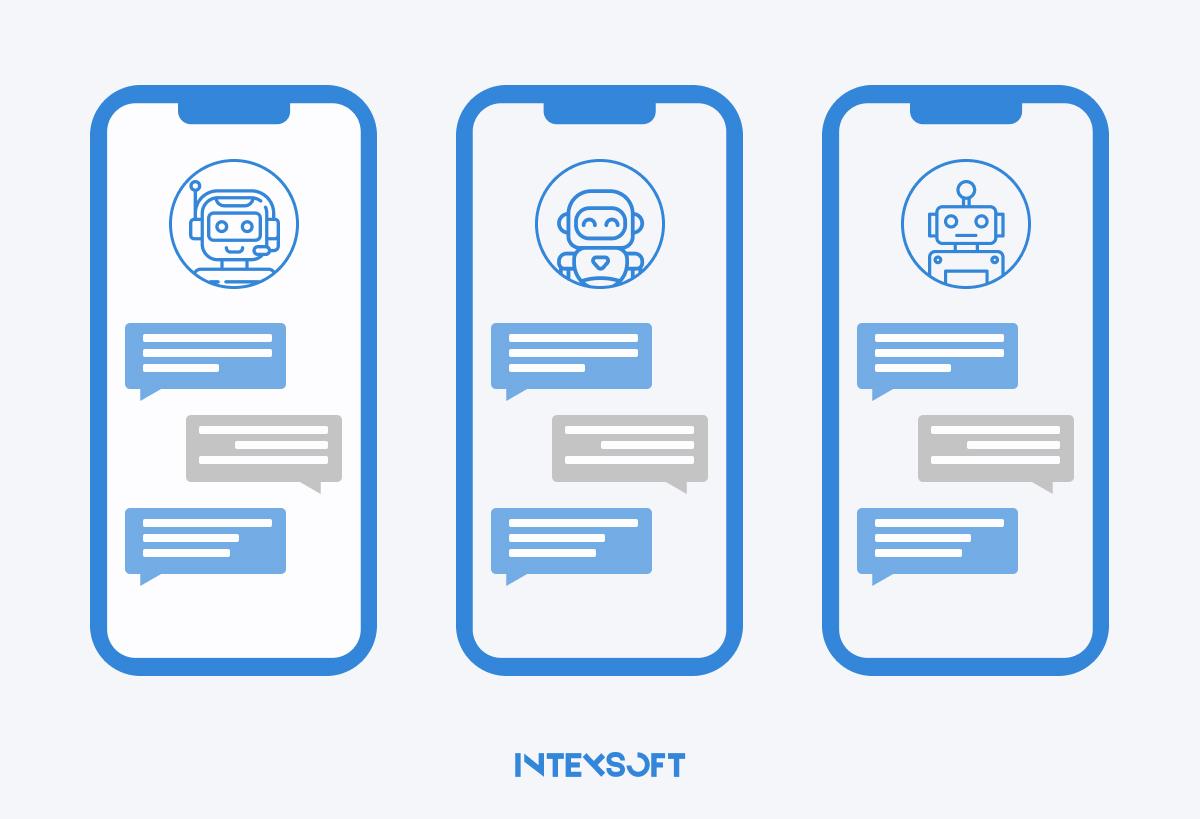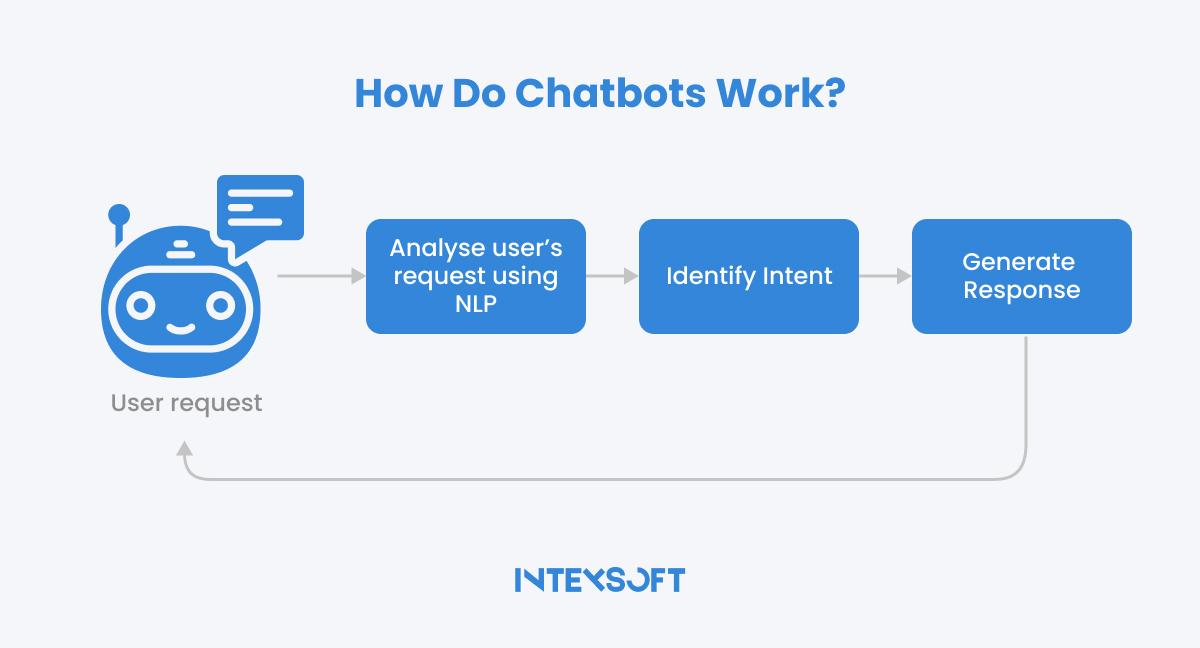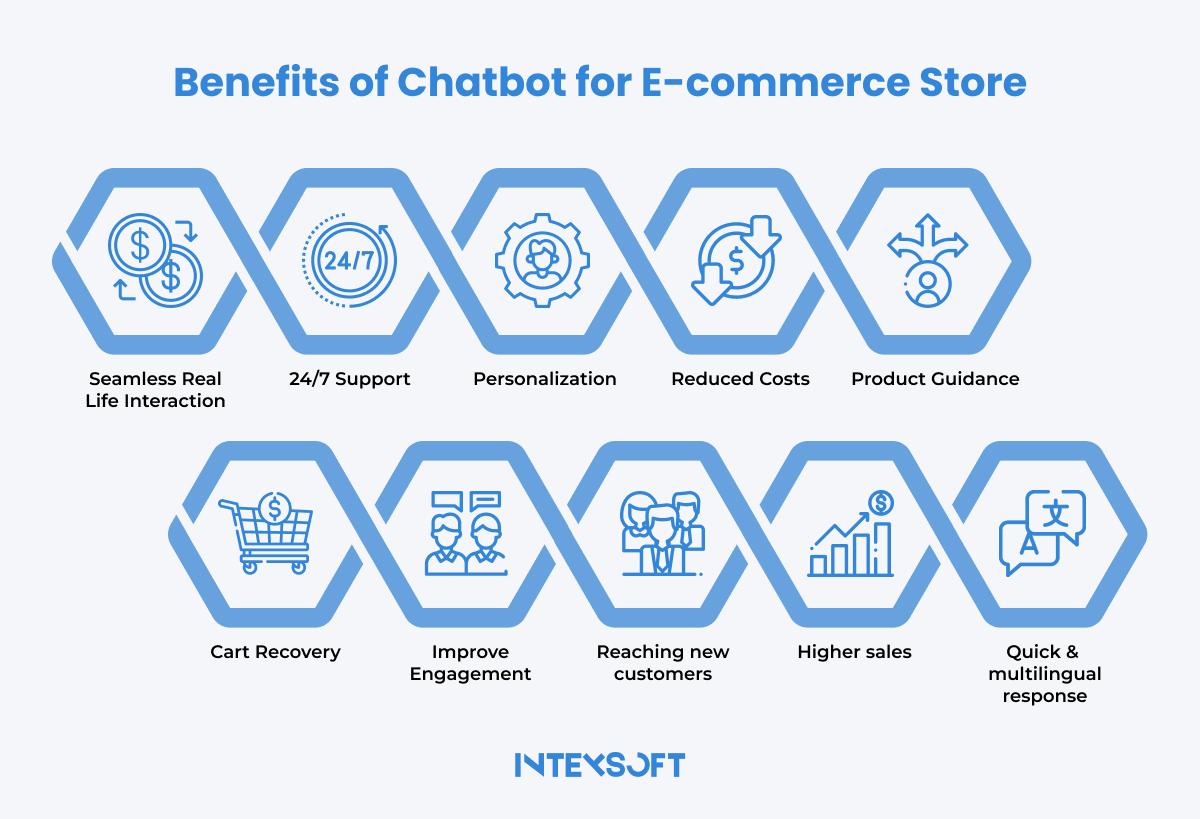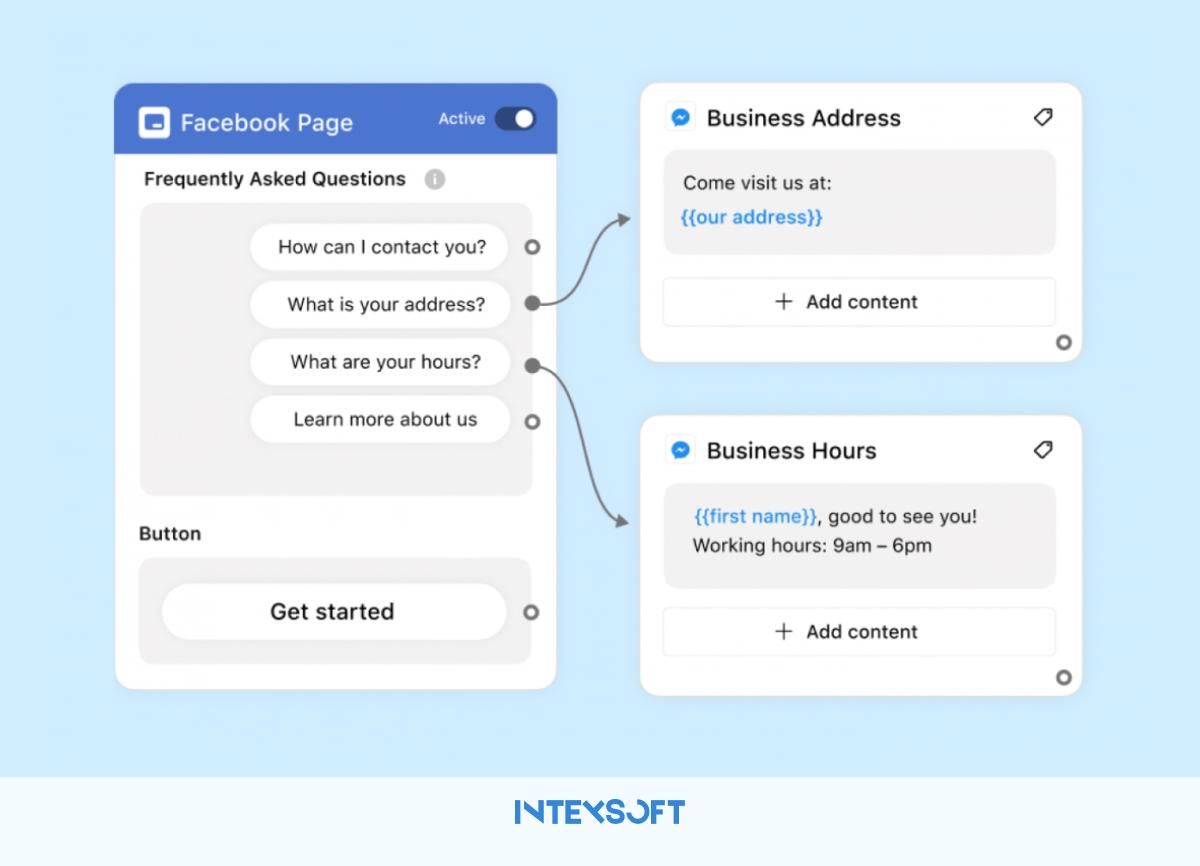Ecommerce Chatbots: The Essential Reasons for Having a Customized Chatbot for Your Online Store


This article unravels why e-commerce website owners should embrace chatbot development. We navigate through each reason, it becomes evident that the strategic integration of chatbots is not merely an option, but a catalyst for ushering in a new era of e-commerce success.
Reading time: 13 min.
As online shopping becomes an integral facet of our daily lives, the quest for seamless, efficient, personalized experiences takes center stage. A pivotal player in this digital transformation is ecommerce AI chatbot development, which leverages artificial intelligence to redefine customer interactions and elevate e-commerce businesses to unprecedented heights.
This article unravels why website owners should integrate chatbot in ecommerce their strategy. Beyond being a fleeting trend, chatbots are proving to be indispensable tools that enhance customer engagement and offer 24/7 support, streamline order processing, deliver personalized shopping experiences, and combat the persistent challenge of cart abandonment.
As we navigate through each reason, it becomes evident that the strategic integration of chatbots is not merely an option, but a catalyst for ushering in a new era of e-commerce success.
Ecommerce chatbots are artificial intelligence (AI) powered virtual assistants designed to interact with users and provide a conversational interface during online shopping. These intelligent chatbots are integrated into e-commerce websites or messaging platforms, offering a range of functionalities to enhance the customer experience, improve engagement, and streamline various processes.
From redefining customer engagement to optimizing operational processes and providing actionable insights, chatbots have become integral components of successful e-commerce strategies. Chatbots significantly impact the dynamics of the online retail industry. Their integration into e-commerce platforms brings about transformative changes, shaping how businesses interact with customers and enhancing operational efficiency.
Key features and capabilities of e-commerce chatbots include:
E-commerce chatbots are programmed to answer customer queries instantly. Whether it’s providing information about products, assisting with order tracking, or addressing common concerns, chatbots offer immediate and round-the-clock support.
To offer personalized product recommendations, leveraging data analytics and machine learning algorithms, chatbots analyze user preferences, past purchases, and browsing behavior. This feature enhances the overall shopping experience by tailoring suggestions to individual tastes.
Chatbots streamline order fulfillment by helping users place orders, track shipments, and manage returns or exchanges. This automation enhances operational efficiency and provides customers with a seamless and hassle-free experience.
E-commerce chatbots leverage artificial intelligence to create interactive and personalized experiences for online shoppers. By combining advanced technologies with a conversational interface, these virtual assistants contribute to increased customer satisfaction, improved operational efficiency, and, ultimately, the success of e-commerce businesses.

E-commerce chatbots have become integral components of online businesses, pivotal in shaping the digital shopping landscape. Their importance extends across various facets of the e-commerce industry, contributing to enhanced customer experiences, operational efficiency, and overall business success.
One of the primary advantages of ecommerce chatbots is their ability to provide round-the-clock customer support. Unlike human agents, chatbots are available anytime to address customer queries, provide information, and assist with issues. It ensures a seamless and continuous support system for users across different time zones.
Ecommerce chatbots offer immediate responses to customer inquiries, providing instant engagement. This quick interaction helps keep users actively involved in shopping, preventing frustration and improving overall user satisfaction. The timely assistance also contributes to a positive brand perception.
Chatbots streamline the order-processing workflow by assisting users in placing orders, tracking shipments, and managing returns. This efficiency enhances the overall customer experience and allows businesses to handle a larger volume of transactions without compromising on service quality.
Through the analysis of user data, ecommerce chatbots offer personalized product recommendations and tailored shopping experiences. By understanding customer preferences and behaviors, chatbots create a more individualized journey for each user, increasing the likelihood of conversions and fostering brand loyalty.
Cart abandonment is a common challenge for online retailers. Ecommerce chatbots intervene during checkout, addressing concerns, providing assistance, and even offering incentives to complete purchases. This proactive approach significantly reduces cart abandonment rates, ultimately boosting sales.
Automating routine and repetitive tasks through chatbots results in cost savings for businesses. While human agents can focus on more complex issues, chatbots handle common queries efficiently, contributing to a more cost-effective customer support strategy.
Ecommerce chatbots are versatile, operating seamlessly across various communication channels, including websites, social media, and messaging apps. This multichannel accessibility ensures customers can engage with the chatbot through their preferred platforms, providing a consistent and cohesive experience.
Chatbots actively collect and analyze user data, offering valuable insights into customer preferences, trends, and feedback. This data-driven approach empowers businesses to make informed decisions, refine marketing strategies, and continually improve their products and services.
As the e-commerce landscape evolves, chatbots demonstrate adaptability to emerging trends, such as conversational commerce. Their integration with messaging platforms aligns with changing consumer preferences for interactive and conversational online shopping experiences.
E-commerce chatbots are not just tools for customer interaction; they are essential components that contribute to the success and growth of online businesses. Their ability to provide instant support, personalize experiences, and optimize operational processes positions them as critical assets in navigating the complexities of the digital retail landscape. As technology advances, businesses that recognize the importance of ecommerce chatbots will likely gain a competitive edge in delivering exceptional customer experiences.

Staying ahead of the curve requires innovative strategies that meet and exceed customer expectations. One such transformative tool that is reshaping the digital shopping experience is the ecommerce shopping chatbot. Here’s why your business needs to embrace this technology:
Ecommerce chatbots actively engage users, offering personalized assistance and product recommendations. Its heightened engagement increases conversion rates as customers are guided through the purchase journey, reducing the likelihood of abandoned carts.
Chatbots automate interactions, providing a seamless experience for potential customers. By actively engaging with website visitors, chatbots contribute to lead generation efforts, capturing valuable information and nurturing leads through automated conversations.
Leveraging customer data, chatbots suggest complementary products and facilitate upselling and cross-selling opportunities. This direct impact on sales contributes to higher average order values, ultimately boosting revenue.
In the age of instant gratification, e-commerce chatbots provide round-the-clock customer support. Users receive instantaneous responses to queries, which addresses concerns promptly and fosters a positive customer experience.
Ecommerce chatbots seamlessly integrate across various platforms, including websites, social media, and messaging apps. It ensures a consistent and cohesive user experience, irrespective of the platform they choose for interaction.
Chatbots enhance advertising campaigns by providing interactive and personalized experiences. Whether it’s guiding users through a promotional offer or answering queries related to an advertisement, chatbots amplify the impact of marketing efforts.
Automating routine customer service tasks with chatbots results in cost savings. Businesses can allocate resources more efficiently, allowing human agents to focus on complex issues while chatbots handle common queries, making customer service operations more cost-effective.
Ecommerce chatbots collect and analyze user data, providing actionable insights into customer behavior, preferences, and trends. This data-driven approach empowers businesses to make informed decisions, refine marketing strategies, and continuously optimize their offerings.
Chatbots provide scalability during peak demand periods. As customer inquiries surge, chatbots efficiently handle increased interaction volumes, ensuring a smooth and responsive user experience even during fluctuations in demand.
Integrating an ecommerce chatbot into your business strategy is not just a technological upgrade; it’s a strategic investment that directly impacts customer engagement, conversion rates, and overall business growth. By leveraging the power of chatbots, your business can navigate the digital commerce landscape with agility, ensuring a seamless and personalized experience for your customers.

Choosing the right type of chatbot for an ecommerce business depends on specific needs, resources, and the level of sophistication required in customer interactions. Let’s look at these types and ecommerce chatbot use cases.
AI-driven chatbots, often referred to as intelligent or smart chatbots, leverage advanced technologies such as natural language processing (NLP) and machine learning (ML). These chatbots have the ability to understand and interpret user inputs, allowing them to provide more sophisticated and contextually relevant responses.
AI-driven chatbots comprehend and interpret user queries in a manner that simulates human-like understanding.
They analyze user data to offer tailored product recommendations, enhancing the overall shopping experience.
AI-driven chatbots continuously learn and improve their responses based on user interactions, evolving over time to better meet user needs.
Engaging users in natural and dynamic conversations, guiding them through the shopping journey.
Providing individualized support, such as order tracking, personalized recommendations, and addressing specific customer queries.
Rules-based chatbots operate on pre-defined decision trees and static rules. These chatbots follow a set of programmed instructions to respond to user inputs, making them more predictable but effective for handling specific scenarios.
Rules-based chatbots follow predefined decision paths based on the user’s inputs, ensuring consistent and rule-bound interactions.
They excel at handling specific tasks and queries that can be anticipated and programmed in advance.
Handling routine inquiries, providing information on shipping, returns, and other common queries.
Offering instant updates on the status and location of customer orders.

Hybrid chatbots combine elements of both AI-driven and rules-based approaches. These chatbots use predefined rules for certain scenarios and incorporate AI capabilities to handle more complex and dynamic interactions.
Hybrid chatbots leverage AI for understanding the context of user queries while relying on rules for specific, well-defined tasks.
They offer a balance between the structured nature of rules-based chatbots and the adaptability of AI-driven chatbots.
Handling routine queries using rule-based logic, but seamlessly escalating to AI-driven capabilities for more complex scenarios.
Engaging in conversations that may involve a mix of predefined responses and contextually generated content.
The choice between existing solutions and custom development depends on the business’s specific needs, budget constraints, and the desired level of customization and control. Existing solutions may offer a quick and cost-effective solution for companies with straightforward requirements. However, those with unique needs and a focus on long-term scalability and brand consistency may find custom development the most suitable.
Chatfuel is a user-friendly chatbot-building platform that allows businesses to create Facebook Messenger chatbots without coding knowledge. It offers drag-and-drop functionality, making it accessible to users with various technical backgrounds.
Flow XO is a comprehensive chatbot platform that supports multiple messaging channels, including Facebook Messenger, Slack, and WhatsApp. It provides a visual interface for building chatbot workflows, making designing and implementing conversational interactions easy.
Manychat is a popular chatbot platform designed for Facebook Messenger. It offers a visual chatbot builder, automated sequences, and features like growth tools for increasing audience engagement. It’s known for its simplicity and versatility.
Botsify is a chatbot solution that allows businesses to create AI-powered bots for websites and messaging platforms. It offers a drag-and-drop interface, natural language understanding (NLU), and integrations with popular platforms like WordPress and Shopify.
Custom chatbot development refers to the creation of the best ecommerce chatbots solution explicitly tailored to a business’s unique needs, goals, and requirements. Unlike off-the-shelf or pre-built chatbot solutions, custom development involves designing and building a chatbot from the ground up, often focusing on providing a personalized and highly targeted user experience.
Custom chatbot development allows businesses to build a solution tailored to their unique requirements, ensuring it meets specific goals and integrates seamlessly with existing systems.
Custom chatbots can be designed with scalability, allowing them to grow and adapt as the business expands. They can also be easily integrated with other systems, providing flexibility in functionality.
Businesses have complete control over the features and capabilities of custom-developed chatbots. It means they can implement advanced functionalities unique to their industry or customer base.
Custom chatbots can be designed to align seamlessly with the brand’s visual identity, tone, and overall messaging strategy, ensuring a consistent and cohesive brand experience.
| Existing Solutions | Custom Development | |
| Ease of Implementation | Quick setup with pre-built templates | Time-consuming due to coding and testing |
| Cost | Generally more cost-effective | Higher upfront costs, potentially lower long-term costs |
| Customization and Control | Limited customization options | Complete control over features and design |
| Scalability | Limited scalability in some cases | Highly scalable based on business needs |
| Integration Possibilities | Limited integrations with specific platforms | Seamless integration with existing systems |
| Adaptability to Unique Needs | Limited, based on pre-built features | Tailored to specific business requirements |
Monitor these metrics regularly and use the insights gained to iterate and improve the chatbot’s performance. Continuous optimization is critical to ensuring ongoing success.
Remember that the significance of each metric may vary based on your e-commerce business’s unique goals and objectives. Regularly reassess the relevance of these metrics in alignment with evolving business strategies and customer expectations.
This metric measures the number of user interactions with the chatbot over a specific period. It reflects the engagement level and ongoing interactions between users and the chatbot.
Customer insights per user refer to information gathered about individual users through chatbot interactions. It includes preferences, behaviors, and other data points contributing to a deeper understanding of customer needs.
Click-through rate (CTR) to the website measures the percentage of users who click on links or calls-to-action provided by the chatbot and navigate to the website. It gauges the chatbot’s effectiveness in driving users to the main website.
The matched response rate is the percentage of user queries or inputs the chatbot successfully matches with relevant and appropriate responses. A high matched response rate indicates the chatbot’s effectiveness in understanding and addressing user queries.
Cost per Conversion calculates the average cost incurred by the business for each successful Conversion attributed to the chatbot. It helps evaluate the chatbot’s cost-effectiveness in driving desired actions, such as purchasing.
Conversion rate measures the percentage of users who take a desired action, such as purchasing, after interacting with the chatbot. A higher conversion rate indicates the chatbot’s effectiveness in driving users toward specific goals.
Return On Ad Spend (ROAS) measures the revenue generated for every dollar spent on chatbot-related advertising. It helps assess the profitability and efficiency of chatbot-driven advertising campaigns.
The journey towards a successful ecommerce chatbot implementation is not just about deploying a technological solution; it’s about understanding the nuances of user interactions, continuously refining strategies, and aligning the chatbot’s performance with the overarching goals of the business.
In the realm of ecommerce, where user experience is paramount, the success of your chatbot lies not only in its technical capabilities but in its ability to seamlessly integrate with the brand identity, to provide personalized interactions.